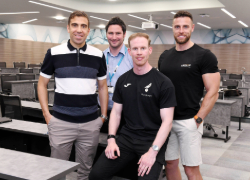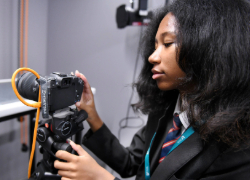Teesside University link will give systems firm competitive edge
Bosses of a fast-growing technology business that designs automated systems for nuclear attack submarines are investing in a new scheme to give them a competitive advantage over their industry rivals.
Applied Integration has joined forces with Teesside University in a two-year Knowledge Transfer Partnership (KTP) designed to encourage businesses to improve their competitive edge through the use of emerging expertise and innovative technologies.
Part-funded by Innovate UK, KTP is a nationwide programme helping businesses improve their competitiveness and productivity through the better use of UK’s knowledge, technology and skills-base.
Academics from Teesside University’s School of Computing are working with Applied Integration to radically redesign the Stokesley firm’s project development framework.
The project is developing software to streamline Applied Integration’s in-house processes, reducing costs and development time associated with the production of hybrid critical systems.
It will focus on introducing internal processes that ensure client requirements are clearly understood at the very outset of major projects.
The partnership is implementing a project designed to save Applied Integration – and its customers – substantial time and money, giving the systems integrator a competitive advantage in a challenging and increasingly demanding market.
Specialising in providing cutting edge solutions to a wide range of 21st Century industries, Applied Integration design and develop the automation and control systems for customers in the petrochemicals, oil, gas and defence sectors.
Shortlisted for the second successive year for both Teesside Company of the Year and the Manufacturing gong in the North East Business Awards, Applied Integration is currently building state-of-the-art, safety-critical control systems for the Royal Navy’s nuclear-powered Astute-class attack submarines.
Leading the university’s team of academics on the project are Dr Peter Gregory, and Dr Joao Ferreira, both are Senior Lecturers and members of the university’s Digital Futures Research Institute They are specialists in optimisation planning and safety critical software development respectively.
Recent Graduate Ali Almohammad has been recruited to work as an associate on the £110,000 project, with engineer Phil White supervising the project within Applied Integration.
Director Garry Lofthouse said: 'We’re excited about the potential for this collaborative project with Teesside University.
'If it’s as successful as we believe it can be, it will provide us with a business tool that will give us a real advantage over our rivals.
'Clearly, having to do work again because a client’s requirements were not 100% understood and agreed at the outset can have a very significant impact on the time and cost of a project.
'It’s estimated that significant changes made towards the end of a project can multiply 15-fold the amount of work necessary had the changes been made at the outset.
'The commissioning segment of the complex projects we carry out traditionally represents 60% of the overall costs, so accurate, standardised requirements capture - covering the ‘what if’ scenarios through fully automated testing - is the planned outcome from the partnership.
'When you consider that some of our Defence sector projects – on nuclear submarines, for instance – can cover a six-year period then it’s easy to understand the importance of getting it right from the very start.'
The Teesside University collaboration is particularly significant for Garry and his fellow directors Lee Raywood and Graham King, as all three are graduates of the University, along with several members of the firm’s engineering team.
Mr Raywood said: 'We see this exciting partnership as the start of a close working relationship with the University.
'This is a cutting edge programme, not only within our industry but any industry, so we are keen to tap into the university’s centre of excellence for mathematic modelling and all the great academic expertise they hold.
'Quality assurance is a particularly critical aspect within the Defence sector, with clients expecting us to demonstrate what we can do before they place an order with us.
'As the complexity of systems within in the Defence sector increases so the importance of the process increases to guarantee the quality of that process.
'Making a success of this project will not only strengthen our existing customer relationships but would potentially help us seal major deals in future.' Laura Woods, Teesside University’s Director of Academic Enterprise, said: 'Knowledge Transfer Partnerships are the best practice route for companies, particularly SMEs, to access university expertise. As well as transferring specific expertise into the business, they help to build a lasting relationship and link the business into university innovation and business networks across the world.'
 Teesside University awards Honorary Doctorates to industry
...
Teesside University awards Honorary Doctorates to industry
... Alumni support elite football event
Alumni support elite football event Girls explore digital careers at state-of-the-art new
...
Girls explore digital careers at state-of-the-art new
...